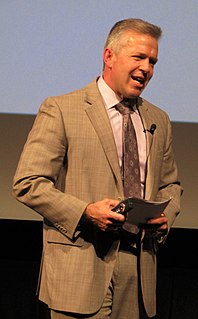A Quote by Anthony de Mello
A master was once unmoved by the complaints of his disciples that, though they listened with pleasure to his parables and stories, they were also frustrated for they longed for something deeper. To all their objections he would simply reply: 'You have yet to understand, my friends, that the shortest distance between a human being and truth is a story.'
Related Quotes
Some would define a servant like this: 'A servant is one who finds out what his master wants him to do, and then he does it.' The human concept of a servant is that a servant goes to the master and says, 'Master, what do you want me to do?' The master tells him, and the servant goes off BY HIMSELF and does it. That is not the biblical concept of a servant of God. Being a servant of God is different from being a servant of a human master. A servant of a human master works FOR his master. God, however, works THROUGH His servants.
Paul Simon once said that a songwriter's supreme challenge was being complex and simple at the same time-writing songs with lasting depth that are also simple enough to be memorable. Jimmy Van Heusen was a master at this kind of song. His music was complex, with deeply rich chord changes any jazzman can embrace, but also possessed catchy, crystalline melodies of exceeding sing-ability. His songs were meant to be sung, not just listened to, and they were sung by the best, with Frank Sinatra and Bing Crosby at the top of that list.
The real master is only a presence. He has no intentions of being a master. His presence is his teaching. His love is his message. Every gesture of his hand is pointing to the moon. And this whole thing is not being done, it is a happening. The master is not a doer. He has learned the greatest secret of life: let-go. The master has drowned his ego and the idea of separation from existence itself.
Everything necessary to understand my grandfather lies between two stories: the story of the tiger’s wife, and the story of the deathless man. These stories run like secret rivers through all the other stories of his life – of my grandfather’s days in the army; his great love for my grandmother; the years he spent as a surgeon and a tyrant of the University. One, which I learned after his death, is the story of how my grandfather became a man; the other, which he told to me, is of how he became a child again.
The master in the art of living makes little distinction between his work and his play, his labor and his leisure, his mind and his body, his information and his recreation, his love and his religion. He hardly knows which is which. He simply pursues his vision of excellence at whatever he does, leaving others to decide whether he is working or playing. To him he's always doing both.
The Master was exceedingly gracious to university dons who visited him, but he would never reply to their questions or be drawn into their theological speculations. To his disciples, who marveled at this, he said, "Can one talk about the ocean to a frog in a well or about the divine to people who are restricted by their concepts?
That’s how Ptolemy imagined the disposition of his memories, his thoughts: they were still his, still in the range of his thinking, but they were, many and most of them, locked on the other side a closed door that he’s lost the key for. So his memory became like secrets held away from his own mind. But these secrets were noisy things; they babbled and muttered behind the door, and so if he listened closely he might catch a snatch of something he once knew well.
Some of the parables that Matthew records and that Jesus delivered as part of his Olivet Discourse-such as the ten virgins and their lamps or the servants and the talents they were given-are some of the best known of Jesus' teachings. Reading them in the context of his prophecies about the end of the world, however, makes them clearly parables of preparation. To be on his right hand with his "sheep" rather than at his left hand with the "goats" at his return, we must prepare ourselves now.
Writing two stories [in the Thorn and the Blossom] about the same set of events that were complete stories in themselves, but also added up to a larger story. As I was writing them, I kept going back and forth, because something would happen in one story that would have to be reflected in the other story. And yet the same event would also have to be perceived in different ways by Brendan and Evelyn, because they are different people with their own interpretations.


































